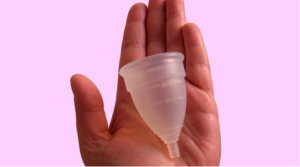Let Your Flow Go
 Periods: that pesky little red friend who likes to knock on your door once a month just to say hello, a friendly reminder that all is going good up in there. But sometimes we wish this friend would just keep to her own business, stop showing up unexpectedly and making a mess all over our front porch.
Periods: that pesky little red friend who likes to knock on your door once a month just to say hello, a friendly reminder that all is going good up in there. But sometimes we wish this friend would just keep to her own business, stop showing up unexpectedly and making a mess all over our front porch.
Society has created so many ways to deal with our periods, but traditional methods always seem to be messy and wasteful. There is the tampon that always tends to leak, pads that make you feel like you’re wearing a diaper, and most recently, the invention of period panties, which are a disposable form of underwear. All of these methods are expensive and not reusable, creating an excess of waste of both money and resources, not to mention the inconvenience of having to run to the store at 1 a.m. with a crimson stained backside because your friend decided to show up early this month.
When I got my period last month, I soon realized the one thing I forgot to pack for college was tampons! I saw the DivaCup on sale at the Motley and purchased one for only $30. DivaCup is a brand of menstrual cups, invented in 2003 as a sustainable and practical form of sanitation. My first reaction was how have these not gone viral yet? They’re seriously the best deal ever, no strings attached…literally.
The DivaCup, like many other brands of menstrual cups, is a small, 3-inch surgical grade silicone cup that you fold and insert into the vagina so that it collects period flow rather than absorbs it like the traditional tampon or pad. This is much healthier for the body, as opposed to pads and tampons, which are unnatural and can cause toxic shock syndrome. DivaCups can collect about one ounce of liquid, which for the average woman is about 12 hours worth of flow, so you do not have to deal with the inconvenience of changing them every couple of hours. Once inserted, the cup expands inside of you, creating suction so it won’t leak. When the cup is full, you just pull it out and flush that flow down, rinsing the cup off with water before reinserting.
For women and girls living in poverty, lack of sustainable and clean menstrual hygiene methods can lead to numerous financial and health burdens. Girls have been known to use anything they can find to absorb the blood, even creating soft wooden bamboo pads or shoving dirt in their underwear because they can’t afford normal pads. Pads are also expensive, averaging at about a dollar a pack in east and west Africa, which can represent a significant percentage of a person’s income.
In fact, tampons aren’t even sold in many places in the world because they’re seen as taboo, potentially breaking the hymen when inserted. In addition, public bathrooms are difficult to locate and often very unsanitary, so changing tampons or pads becomes an issue, especially at school. Due to the lack of bathrooms and access to sanitary products, girls in these parts of the world often skip class when menstruating. Missing three to five days of school once a month really adds up, causing girls to get so far behind that they often drop out. If menstrual cups were made widely available, girls could feel confident and comfortable with their periods and continue to pursue their education.
There are currently many innovative ways in which the traditional menstrual cup is being transformed to an even better and more convenient model. The Softcup is like a normal menstrual cup, except the silicone folds so that you can use it while having sex. If you don’t mind a little natural messiness, than this is an awesome solution to having to forgo sex while menstruating.
There is also a new type of “smart cup” model on Kickstarter called the LOONcup, which uses sensors and Bluetooth technology to track the color and volume of your flow on your smartphone. The cup sends you push notifications, reminding you exactly when to change your cup so that it won’t leak. With all of these innovative models in line, female sanitation no longer has to be a messy and complicated situation. Menstrual cups are the way of the future. Period.
Jess is a first year at Scripps College with a passion for feminist issues, art, and culture. Before coming to Scripps, she took a gap year to travel all over the world. She hopes to major in Feminist, Gender, and Sexuality Studies and learn Hindi while at Scripps so that she can move to India after college.

![[in]Visible Magazine](https://community.scrippscollege.edu/invisible/wp-content/uploads/sites/5/2011/04/Invisible-Masthead-2011-Spring1.png)







Comments are closed.